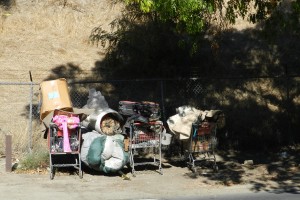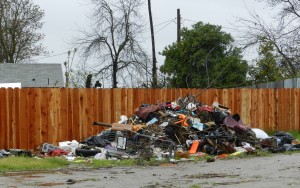
Most homeless people spend almost all their time in public places. The chief reason is simple: There’s nowhere else to go. Yes, there are shelters at night, but they’re often full in bad weather. Pets and couples aren’t allowed (couples are split up). You take in and out only what you can carry. There’s no privacy. There’s enforced religion. The shelters close during the day.
Homeless people in public places are a polarizing presence, mostly because they’re visible. Because they’re often dirty and scary, some people simply want them gone and don’t care how it’s done. Others are sympathetic and want to help. Politicians tend to listen to their most vocal constituents. As a rule, the loudest are angry about the “takeover” of their parks and streets. They want something done and done now.
The most common official response is euphemistically called a “sweep,” better described as a roust. Rousts are the preferred local response to homelessness mostly because our politicians want to be perceived as doing something, no matter how futile, cruel, or temporary. They’ve got to placate their angry constituents.
Sweeps are usually advertised; the law requires seventy-two hour notice. City officials will post the date of the sweep with placards, and give people time to gather their belongings and move on, though everyone knows there’s no place to go (other than another public space). Other times, the homeless people are given verbal notice via bullhorns or personal visits.
Oftentimes, officials don’t show up on the announced day of the sweep. Instead, they show up earlier or later, tell folks to pick up and go, and an hour later bring in the trucks and claw. Anything people can’t carry is swept up and dumped in a truck.
Immediately after a sweep, the targeted area still has homeless people. Some are barefoot in the parking lot, sitting stunned among their remnant belongings. Others perch on benches as usual; they’re the ones whose belongings fit onto a cart, in a backpack, or are easily hidden. The roust is just confirmation of what they’ve known all along: When faced with difficult choices, local officials prefer the political cover of symbol over substance, cruelty over kindness.

Within days after a sweep, tents are back up and trash has begun to accumulate. The trash is as irritating to some of the homeless people as it is to anyone. They sweep and pick up their own litter because they know the trash is a major factor in public discontent, but they also know that their own efforts to clean up will not cut them any slack when there’s another sweep.
They also know that huge piles of trash on vacant lots, vermin-infested motels and trailer parks, and toxic waste piles attract far less public concern than trash in a park, and they know why—they’re not just visible, they’re vulnerable, adrift on the rough seas of poverty. They’re human jetsam, and the first impulse of local authorities is not kindness, it’s cruelty.
Even the officials who tell them to move along know nothing will change. A few homeless people will move to another park for a while, others will move back in within hours and wait for the next roust in much the same way they’ll wait for the next rainstorm or cold spell.
Sweep? It’s like trying to sweep things under the rug when there’s no rug. It’s like squeezing a water balloon and expecting the water to evaporate. Maybe they’re homeless, but at least they’re not crazy enough to spend public money on endlessly futile projects. At least they’re not senselessly cruel, not most of them anyway. Who’s crazy now?

Thanks, Eric, for the very thoughtful, sensitive, and aware article. We need to emulate the 100,000 Homes campaign. Everyone who wants one needs a small home. Utah’s progress in housing their people without shelter shows that it is far less expensive for society in the long run. We can do better!